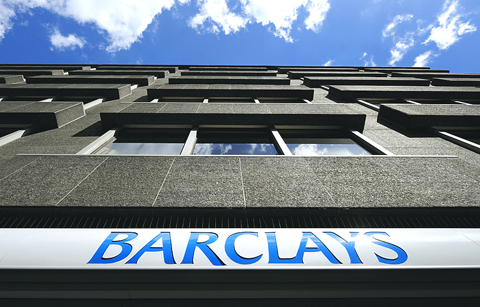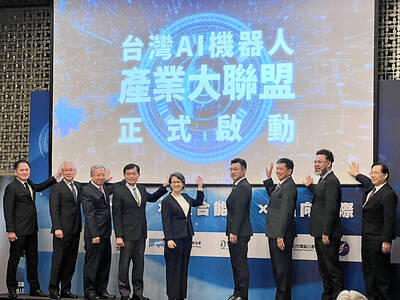Barclays Plc said yesterday first-half earnings rose 10 percent after profit from investment banking almost doubled.
Net income rose to £1.89 billion (US$3.16 billion), from £1.72 billion a year earlier, the London-based bank said yesterday in a statement. That missed the £2.2 billion average estimate of five analysts surveyed by Bloomberg.
Barclays earnings were boosted by thawing credit markets after the company’s September purchase of Lehman Brothers Holdings Inc’s North American unit, formerly the biggest US bond trader. Investment banking also lifted second-quarter profit at Goldman Sachs Group Inc, Deutsche Bank AG and Credit Suisse Group AG as revenue from trading increased.

PHOTO: BLOOMBERG
Profit at Barclays Capital, the lender’s securities unit, rose to £1.05 billion from £524 million in the first six months of the year.
“There’s been a clear concentration of market share amongst the winners, like Deutsche Bank, JPMorgan, Credit Suisse and Barclays,” said Ralph Brook-Fox, a fund manager at Glasgow-based Ignis Asset Management, before the results were announced.
“That looks set to continue,” said Brook-Fox, who helps manage £4.5 billion in UK equities, including Barclays shares.
The bank’s UK retail division posted a gain of £268 billion, compared with £690 billion a year earlier as competition for retail deposits increased pressure on margins and rising unemployment boosted bad debts.
Barclays is the first of the five biggest UK banks to release earnings for the period.
Barclays is the second-best performer on the Bloomberg Europe Banks and Financial Services Index since March 9, the day financial shares began to rebound. The stock has increased five times since then, trailing only Bank of Ireland Plc.
Varley profited from his decision to expand investment banking at a time when his British rivals are focused on cutting costs to help repay government bailouts. Paul Parker, Barclays’ global head of mergers and acquisitions, said in May the company intends to become one of the three leading securities firms across all regions and product lines.
Barclays Capital beat New York-based JPMorgan and HSBC to maintain its position as the world’s biggest underwriter of bond sales during the period, according to data compiled by Bloomberg.
The bank backed US$211 billion of offerings, compared with US$171 billion a year earlier.
The Lehman purchase helped make Barclays the world’s sixth-biggest mergers and acquisitions adviser this year, up from 65th in 2007, Bloomberg data show.
Morgan Stanley, Goldman Sachs and JPMorgan are the top three.
Barclays refused to follow RBS and Lloyds in accepting a taxpayer-funded bailout last October, and then opted out of the state asset protection program in March. That allowed it to avoid handing over a stake to the government.
Instead, the company sold £5.3 billion in stock and convertible notes, or 32 percent of its equity, to the Qatar and Abu Dhabi sovereign wealth funds. Qatar Holding LLC, sold 35 million Barclays shares in June, making a £1.5 billion profit in seven months. Qatar still owns 10.2 percent of Barclays through two investment vehicles, making it the bank’s largest shareholder, a July 6 statement said.
Barclays agreed in June to sell its fund management unit, Barclays Global Investors, to New York-based BlackRock Inc for US$13.5 billion to boost its capital further.
Barclays’ core Tier 1 capital ratio will rise to 8.8 percent after the BGI deal, the bank said yesterday.
It was 5.6 percent at the end of last year.
The BGI sale will cost Barclays a division that generated 15 percent of the group’s profit while offloading 1 percent of its risky assets, said Sandy Chen, a London-based analyst at Panmure Gordon & Co, who has a “sell” rating on the stock.
Also See: HSBC reports 57% fall in profit for first half of year

The paramount chief of a volcanic island in Vanuatu yesterday said that he was “very impressed” by a UN court’s declaration that countries must tackle climate change. Vanuatu spearheaded the legal case at the International Court of Justice in The Hague, Netherlands, which on Wednesday ruled that countries have a duty to protect against the threat of a warming planet. “I’m very impressed,” George Bumseng, the top chief of the Pacific archipelago’s island of Ambrym, told reporters in the capital, Port Vila. “We have been waiting for this decision for a long time because we have been victims of this climate change for

MASSIVE LOSS: If the next recall votes also fail, it would signal that the administration of President William Lai would continue to face strong resistance within the legislature The results of recall votes yesterday dealt a blow to the Democratic Progressive Party’s (DPP) efforts to overturn the opposition-controlled legislature, as all 24 Chinese Nationalist Party (KMT) lawmakers survived the recall bids. Backed by President William Lai’s (賴清德) DPP, civic groups led the recall drive, seeking to remove 31 out of 39 KMT lawmakers from the 113-seat legislature, in which the KMT and the Taiwan People’s Party (TPP) together hold a majority with 62 seats, while the DPP holds 51 seats. The scale of the recall elections was unprecedented, with another seven KMT lawmakers facing similar votes on Aug. 23. For a

Taiwan must invest in artificial intelligence (AI) and robotics to keep abreast of the next technological leap toward automation, Vice President Hsiao Bi-khim (蕭美琴) said at the luanch ceremony of Taiwan AI and Robots Alliance yesterday. The world is on the cusp of a new industrial revolution centered on AI and robotics, which would likely lead to a thorough transformation of human society, she told an event marking the establishment of a national AI and robotics alliance in Taipei. The arrival of the next industrial revolution could be a matter of years, she said. The pace of automation in the global economy can

All 24 lawmakers of the main opposition Chinese Nationalists Party (KMT) on Saturday survived historical nationwide recall elections, ensuring that the KMT along with Taiwan People’s Party (TPP) lawmakers will maintain opposition control of the legislature. Recall votes against all 24 KMT lawmakers as well as Hsinchu Mayor Ann Kao (高虹安) and KMT legislative caucus whip Fu Kun-chi (傅崐萁) failed to pass, according to Central Election Commission (CEC) figures. In only six of the 24 recall votes did the ballots cast in favor of the recall even meet the threshold of 25 percent of eligible voters needed for the recall to pass,